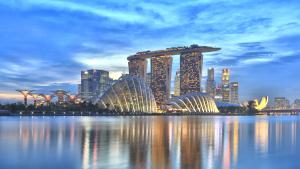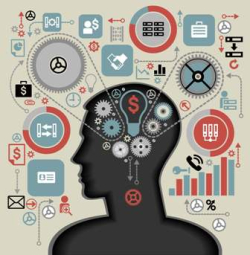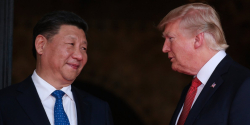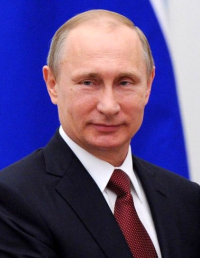 The current economic era is unique.
The current economic era is unique.
In the past, economies were driven by human labor, by land and its resources, by financial capital, or by infrastructure.
Technology is different.
Technology doesn’t require land, it can replace resources, and it doesn’t require massive amounts of low-skilled labor. Singapore (right), Hong Kong, Israel and Silicon Valley have none of these things.
What these and other tech centers have, is trained minds in abundance. They can create them. They can attract them. They nurture them. They give them what they need to thrive.
 Intellectual capital is what matters in today’s economy. Intellectual capital is the gating factor for economic growth. That’s why freedom matters. In today’s technological era, you grow by having new thoughts, and by executing on those thoughts. You can’t think new thoughts without freedom. You can’t execute on them without it, either.
Intellectual capital is what matters in today’s economy. Intellectual capital is the gating factor for economic growth. That’s why freedom matters. In today’s technological era, you grow by having new thoughts, and by executing on those thoughts. You can’t think new thoughts without freedom. You can’t execute on them without it, either.
Tolerance also matters. You don’t know where new thoughts are going to come from. You must be willing to nurture every potential source of talent, to listen and test their views and their voices, if you’re to truly prosper. It doesn’t matter whether that mind belongs to a woman or someone who is disabled. Their color doesn’t matter. Who they love doesn’t matter. What you want is the thought, and the work that lies behind it. What you need is their commitment to those thoughts, and a willingness to execute on them.
Prejudice doesn’t pay.
It especially doesn’t pay for the prejudiced. If you’re not listening to someone, because of who they are, their effort is wasted. It’s like coal smoke going into the air, or heat from a laptop’s battery. The most powerful economies are the most efficient with the things that matter, and nothing matters today as much as imagination.

There’s a reason the richest Americans are hot for charter schools today. They’re looking for talent. It’s not that not all men are created equal. They’re all created different. Those differences are important. Because it’s out of those differences that great thoughts come.
There’s tremendous waste in the charter school model, because talent doesn’t always manifest itself at an early age. Some people are late bloomers. Some people have ADHD, or OCD, or dyslexia. Charter schools, schools of choice, will tend to favor those who adapt well right away, the kids who are socially adept, obedient, and willing. That’s not talent. That’s compliance.

There are inefficiencies in how even those who are desperate for talent approach the problems of running our highly technological society.
For the last few decades America has gotten around this by importing talent. The American South, despite a wasteful social and political system, has prospered over the last 40 years because it could import talent. Most people in Atlanta aren’t from around here. I’m a New Yorker.
The same is true for Silicon Valley. Only they import talent from overseas. Know why Microsoft and Google are led by Indian immigrants? It’s because they earned it.

These policies are destroying our economy and giving the future over to our adversaries.
China has advantages over the U.S. They have a lot of people and social cohesion, they’re young, scrappy and hungry, they are building ultra-modern infrastructure and have plenty of capital.
But they should not be catching up. China is a prison for the human mind. Only those who are compliant have any chance of succeeding, and great minds aren’t compliant by their nature. China is also aging, fast, and is as resistant to importing talent as Japan, which is rapidly falling into the demographic pit.
China should not be catching up to us. But they are, because our present economic and social policies encourage the waste of intellectual capital.

The only way Russia can stay relevant is through the war of all against all. If every other country is fighting within itself, or with a neighboring country, Russia looks bigger by comparison, exercising power on the world stage and keeping its own masses in line.
That’s why Russia picked Trump. It’s why it pushed Brexit. It’s why it supports Syria. Russia wants to push groups of people against one another, rather than behind anything coherent, to maintain its power in the world and maintain Putin in power.
The key to beating Putin, to beating China, and to saving this planet for our grandchildren lies in nurturing intellectual capital. We need policies that encourage its formation, that encourage its discovery, that bring more of it into our marketplace.
This is the key economic struggle of our time, and the key to our political struggles as well.










